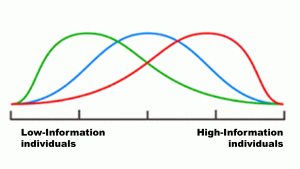Generalist or Specialist?

Are you a generalist, or a specialist, or both?
It’s fair to say that on any topic you fall on a continuum from no knowledge, to some knowledge, to proficiency. Depending on the topic, there may be more or fewer people in each category. (The green curve shows fewer experts on the topic, and the red curve shows more.) In addition, you are likely to be at different points of the curve for different topics.
Regardless of the curve’s shape, who do you expect to be more open to new information—experts or uninformed people? It depends on who is more curious and open to new viewpoints. That said, being a generalist—a person in the middle of the curve—may have advantages.
A recent article by David Epstein (author of Range: Why Generalists Triumph in a Specialized World) lays this out. The gist is that generalists who dabble in a bunch of things build problem-solving skills by synthesizing information from multiple sources. The expansiveness of the “dabbling” generates a stronger approach to problem-solving. It promotes “active open-mindedness.”
Active open-mindedness is a hallmark of those who can make good predictions. Rather than searching for data that confirms their opinions (assumptions), they consider new evidence, whether or not it supports their beliefs. (The studies focused on geopolitical issues, but may have broader applications.) This is a trait referred to as science curiosity.
“Science curiosity is different from science knowledge. Science-curious folk always chose to look at new evidence, whether it aligned with their beliefs or not. Less science-curious adults became more resistant to contrary evidence and more politically polarized as they gained subject matter knowledge.”
Source: Chances Are You’re Not as Open-Minded As You Think
There was another interesting statement in the article. “Curiosity—and a broad range of knowledge—might be a kind of superpower.” The superpower is the ability to transcend narrow-minded thinking. And the narrow-mindedness may be stronger at the extremes on the curve.
The Curse of Specialists
Specialists, by definition, devote themselves to the study of one subject or area of expertise. As they move toward “guru” status, they learn more and more about less and less. That’s not necessarily bad unless it pushes them toward myopia.
It might appear that the in-depth education and knowledge required for expertise is part of the problem. But it’s more than that. A critical issue is how they think.
Do they cherry-pick data that supports their viewpoint? Are new insights ridiculed? Does ego get in the way? “Are they curious?
The Curse of the Uninformed
At the other extreme, people who have no knowledge on a topic may be swayed too easily.
There’s an old, crude movie called Idiocracy, a dystopian comedy set 500 years in the future. In that future—devoid of education, knowledge, and intellectual curiosity—crops aren’t growing because they were being irrigated with a sports drink rather than with water. A man of average intelligence from 2005 awakens in that society after having been in suspended animation from an experiment long forgotten. He has trouble convincing the no-knowledge population of the value of water, but is eventually successful in sprouting new crops.
Yes, the uninformed can be just as set in their ways as some specialists. That brings us to the middle of the curve, the generalists.
The Potential of Generalists
Generalist are people whose skills can be applied to a variety of disciplines. While they may not have the depth of knowledge specialists have in a given field, they often know something about a lot of different subjects.
Being a generalist gives you a level of curiosity that specialists sometimes don’t have. Generalists rely on specialists, though. Generalists need in-depth information when they’re making projections or decisions. But they also need the ability to bring in counter points of view. That’s why generalists in Epstein’s research showed more predictive abilities.
If you are predicting something and you have no knowledge, the prediction is a guess—pure chance. If you are a specialist, you may be so invested in the status quo that you overlook new possibilities. A generalist can be the bridge needed.
